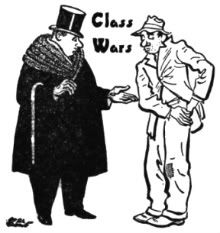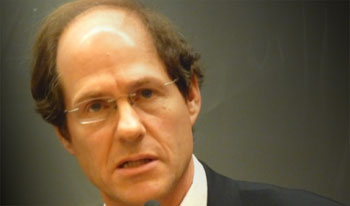Pages: << 1 ... 1103 1104 1105 1106 1107 1108 1109 1110 1111 1112 1113 ... 1276 >>
First Iceland, then the World

First Iceland, then the World
The public is angry. Why should the public pay for the bankers mistakes. Iceland blogger Halldor Sigurdsson
Who cleans up the mess when ignorant, greedy bankers rack up massive debt then go broke? The people of Iceland made a strong statement Saturday. The sins of big bankers and government regulators shouldn't fall on the citizens. By a 93% to 2% margin, they voted down a proposal requiring them to cover bad debt incurred by one of the nation’s oldest and largest banks. Covering the debt would have cost Iceland's 317,000 citizens around $17,000 each.
Iceland's national referendum was the first opportunity for the people of any nation to vote directly on who pays when the financial elite fail.
As citizens voted, Iceland's Prime Minister was dismissing the importance of the vote and promising to negotiate a payment scheme obligating citizen subsidies for bad debt created by Iceland's beyond-bad bankers.
Questions for Candidate Palin and Sister Sarah
eileen fleming

The New Apostolic Reformation/ NAR is a religious movement of elites and regular people guided by an entire genre of books, texts, videos and other media. Among NAR adherents, is Sarah Palin and the NAR just may be the largest religious movement you've never heard of. Jesus called politicians foxes and in a country where Sarah Palin is being touted as presidential material, the issue of faith in politics has never been more deadly.
To Sarah Palin and The New Apostolic Reformation
Researcher Rachel Tabachnick, reported regarding NAR videos that they “demonstrate the taking control of communities and nations through large networks of 'prayer warriors' whose spiritual warfare is used to expel and destroy the demons that cause societal ills. Once the territorial demons, witches, and generational curses are removed, the 'born-again' Christians in the videos take control of society."
The Russell Tribunal on Palestine - Barcelona Session
Stephen Lendman
Launched on March 4, 2009, "The Russell Tribunal on Palestine (RTP) seeks to reaffirm the primacy of international law (to settle) the Israeli-Palestinian conflict (by focusing on) the enunciation of law by authoritative bodies (and) address(ing) the failure of application of law even though it has been so clearly identified. (It begins where the International Court of Justice) stopped: highlighting the responsibilities arising from the enunciation of law, including those of the international community, which cannot continue to shirk its obligations."
RTP is part of the BRussell Tribunal, named after famed philosopher, mathematician, and anti-war/anti-imperialism activist Bertrand Russell (1872 - 1970), who warned over 50 years ago:
Anatomy of Conspiracy Theory
Zahir Ebrahim

Some may rationally ponder that how is it, that such a long running global conspiracy for world government as outlined in Project Humanbeingsfirst's report “The Enduring Capitalist Conspiracy for World Government”, can be kept alive across centuries and across geographies. This brief paper examines that question.
Noam Chomsky had once observed an insightful nature of such “conspiracies”, as the open shared natural goals stemming from the very nature of its definition, which could therefore, no more be termed a conspiracy than both GM and Ford endeavoring to maximize their profits at all cost be termed a 'global corporate conspiracy'.
I have always added to that, the equally un-remarkable observation that a hungry lion anywhere in the world pouncing upon a lamb is similarly no global conspiracy by the world's lions to eat up all the lambs on the planet. That is just the nature of the bestial predators when its “might defines right”. The higher cerebral concepts of “right”, “wrong”, “moral”, immoral”, etc., do not even exist among any primal predators, for these only behave according to their nature. Pious platitudes, if they could be argued by the lion or the snake for instance, would in fact only be disseminated to the lambs and the mice to make them an even easier morsel to acquire!
US - China: Provoking the Creditor, Hugging the Holy man (Washington’s Road to Ruin)
James Petras

The Obama Administration has heightened tensions with China through a series of measures which can only be characterized as major provocations designed to undermine relations between the two countries. These provocations include political support for separatist movements, such as the US-funded theocratic-monk led Tibetan secessionists and the Washington-based Uyghur secessionists, as well as through the $6.4 billion-dollar advanced arms sales to Taiwan, a virtual protectorate of the US Navy. President Obama has publicly met with and openly backed these separatist and secessionists groups, flaunting Washington’s refusal to recognize China’s existing borders. This is part of the US strategy of encouraging the physical break-up of independent nations, which are viewed as ‘obstacles’ to its program of global military empire building.
In addition to continuing and escalating the hostile policies of his predecessor, the Obama Administration has exploited several other issues in order to rally American public opinion and mobilize overseas allies behind its confrontational posture. First, the Obama Administration claims that China’s currency (the Renminbi) is artificially undervalued to give Chinese exports an unfair price advantage, thus undercutting US manufacturing exports and costing “millions of American jobs”. And secondly, the Administration claims that, after the US had opened its domestic manufacturing market to Chinese firms, the Chinese would not ‘reciprocate’ and open their financial sectors to Wall Street investment banks.
Not One More Mountain!
Sandra Diaz

Americans from Across the U.S. Ask Congress and President Obama To End Mountaintop Removal Coal Mining in 2010
WASHINGTON DC - During the 5th Annual End Mountaintop Removal Week in Washington March 6-10, over 200 citizens from across the United States will be uniting in the nation's capital to demand the end to mountaintop removal coal mining, one of the most urgent environmental and social justice issues facing America today.
Deconstructing Sunstein
by Keith Johnson

“Some of the nation's most important policies are implemented through regulation. In domains as diverse as energy efficiency, environmental protection, health care, occupational safety, civil rights, communications, homeland security, and many more, the government attempts to protect its citizens through regulations.” -Cass Sunstein
On February 16, 2010, Cass Sunstein made his first public speech as Obama’s regulation and information “Czar” during a keynote address at the American University's Washington College of Law. From it, we learn firsthand how a scientific dictatorship is being structured. Sunstein discusses techniques to manipulate human behavior in order to facilitate, or in his own words, “nudge” people into compliance with government policy. What’s frightening about his plan is that it parallels the social engineering outlined in Lord Bertrand Russell’s “The Impact of Science on Society”.
SUPRESSING EVIDENCE, DAVID MILIBAND AND UK COMLICITY IN TORTURE
BY SARAH GILLESPIE

Last Saturday I went to see Polly Nash and Andy Worthington’s harrowing documentary ‘Outside the Law, Tales from Guantánamo’ at London’s BFI.
The film knits together narratives so heart-wrenching I half wish I had not heard them. Yet the camaraderie between the detainees and occasional humorous anecdotes, such as Binyam Mohammed’s false confession that he tried to induce nuclear fission on April 1st, provide a glimpse into the wit, courage and normalcy of the men we are encouraged to perceive as monsters.
Violations of Iraqi Children Rights Under the American Occupation
Dr. Souad N. Al-Azzawi, Associate Professor in Environmental Engineering

For two decades, Iraqi children, along with all other elements of Iraqi society, have been subjected to grave human rights violations.
These violations began with the destruction of all civil services and Iraqi civil infrastructure by the US/UK aggression on Iraq during the Gulf War of 1991, and were followed by the brutal economical sanctions which deprived the people of Iraq of food, clean water, health care, education and security.
As a result more than half a million Iraqi children died during the nineties [1].The thirteen years of suffering under embargo ended with the American invasion of Iraq in 2003.
HIJAB: A Tale of Two Richards
by Nadia Hijab

They hail from opposite parts of the globe, but they have much in common: Jewish; experts on and passionate defenders of international law; and pummeling bags for Israel and the Palestinian Authority. And the future of the law of war lies at the heart of the campaigns against them.
Richard Goldstone, whose international stature was cemented as chief prosecutor in the Yugoslavia and Rwanda tribunals, has been excoriated by Israel and its allies ever since his team submitted the report on the Gaza war requested by the United Nations Human Rights Council in September 2009. The steady stream of invective (the report is “full of lies,” and he has “used his Jewishness to jeopardize the safety and security of Israel” are just two of the milder attacks) has also targeted his family and taken a toll on the publicly stoic judge.
<< 1 ... 1103 1104 1105 1106 1107 1108 1109 1110 1111 1112 1113 ... 1276 >>




